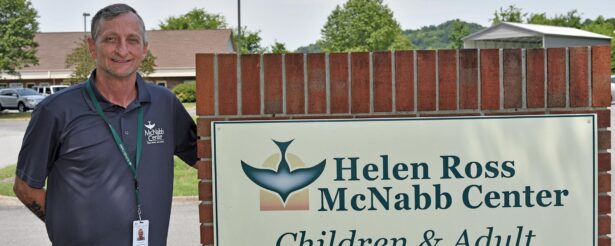“I was homeless, jobless and hopeless.”
Jonathan Stewart says that about a lifetime of loss and depression that led to self-medication with drugs and alcohol. But, through a brush with law enforcement and a court mandate, Stewart found hope.
Ordered to a Sevier County recovery home operated by the McNabb Center—the region’s leading nonprofit provider of mental health, substance use, social and victim services—Stewart worked toward a new future.
At the recovery home, Stewart met with an American Job Center career specialist and told her that he wanted to obtain his high school equivalency diploma. After passing the test on the first try, he set his sights on going to trade school. He enrolled in the collision repair program at the Tennessee College of Applied Technology (TCAT) in Knoxville. The job center supplied him with gas cards to help him make the trip between Sevier County and Knoxville.
“The American Job Center connects multiple partners and resources with Tennesseans to help them move forward toward meaningful work and a living wage. Our goal is to help customers, whether job seekers or employers, meet their needs,” says Jennifer Eppley, of the center’s one stop program.
The Center for Industrial Services (CIS), an agency of the UT Institute for Public Service, joined forces with the East Tennessee Local Workforce Development Area in 2022. As the operator, CIS coordinates multiple job center partners and service providers throughout
East Tennessee.
“We are proud to be working with the American Job Center team to serve job seekers and employers to further strengthen our workforce development system and to contribute to the region’s economic success,” CIS Executive Director Paul Jennings says.
While training in collision repair, Stewart started work at a co-op at Boatmate Trailers in Maryville, and the company hired him full time once he completed his certification.
“The job center gave me every resource I needed,” he says. “They helped me find the information I needed to get my high school equivalency diploma, paid my gas expenses to get to TCAT, and they purchased the tools I needed for school. I hope to get some of my guys in the recovery house to connect with the job center.”
In addition to his job with Boatmate, he also works as a property manager for the McNabb Center, where he continues to live in the recovery house. He hopes one day to become a peer recovery specialist and work full time with the McNabb recovery program.
“My life is so much better. It is night and day compared to what it used to be,” says Stewart, who married in the spring. “The job center has so many resources that people don’t know about. They are the type of people who will do anything to help you succeed. Until the people at Sevier County Workforce Probation put me in touch with it, I didn’t know it existed. They completely changed my life.”

